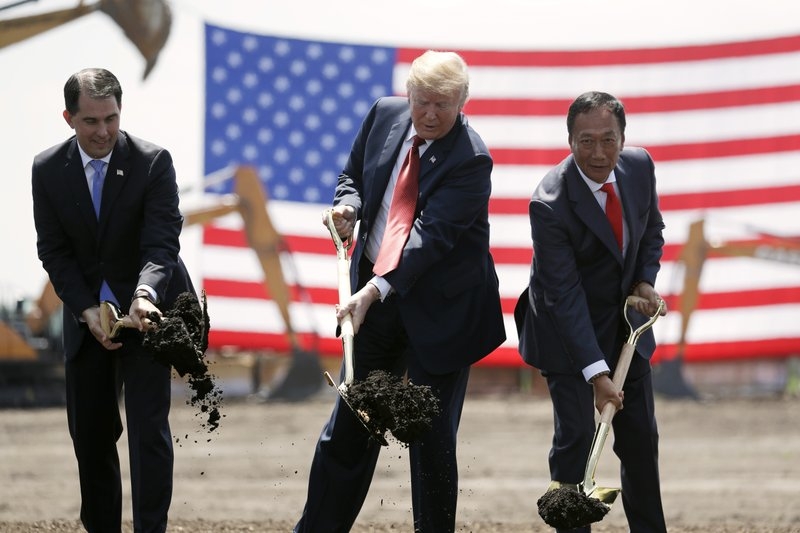Wisconsin
Foxconn head says sea goddess came to him in dream to run for president; Evers talking change for Wisconsin plant

The President of Foxconn is now running for President in Taiwan.
Terry Gou, chairman of the world’s largest contract assembler of consumer electronics, including Apple’s iPhones, said he will bring his pro-business and China-friendly policies to what is expected to be a crowded field for next year’s election.
The Foxconn chairman ranks among Taiwan’s richest people with a fortune estimated at $7.8 billion
He told reporters earlier in the day he was inspired by the Chinese Sea Goddess Mazu to seek office, saying “Three days ago Mazu came to me in a dream. She told me she hoped the people will have a better life.”
Foxconn is in the process of building a plant in Racine County, though plans have changed, seemingly, each week. The grand scheme was to build a plant that would invest $10 billlion in Wisconsin and hire up to 13,000 people.
Wisconsin would then be on the hook for $4.5 billion in state and local tax incentives — largest public subsidy package to a foreign company in U.S. history.
Gov. Tony Evers says today it’s “unrealistic” to think that Foxconn will employ those 13,000 people in Wisconsin, given that the size of its planned manufacturing facility has been reduced.
He says changes are being looked at because the current contract “deals with a situation that no longer exists.”
Gou has no clear successor, and the announcement raises questions about how the company will be run.
He plans to step down as chairman of Foxconn “in the coming months.”
A Village Hall meeting in Mount Pleasant, where Foxconn is building, drew questions about how plans will continue in Wisconsin and who will take over.
Foxconn did not send a representative to the meeting.
Gou’s candidacy would be the first for a Taiwan business mogul and may appeal to Taiwanese who want a different leadership style, said Liang Kuo-yuan, president of Polaris Research Institute, a think tank in Taipei. Middle class Taiwanese dissatisfied with stagnating incomes are most likely to vote for him, he said.
“He will value timeliness and if something has run its course, he will quit it,” Liang said. “We will see efficiency and control of costs.”
Gou is likely to face criticism from China skeptics in Taiwan over Foxconn’s 12 factories in nine Chinese cities, said Huang Kwei-bo, vice dean of the international affairs college at National Chengchi University in Taipei.
Manufacturing costs less in China than in Taiwan, where Foxconn is headquartered. Foxconn factories employ hundreds of thousands of people in China and have a reputation for sometimes harsh work conditions.
Gou, the 68-year-old son of a police officer who moved to Taiwan after the Communist takeover of the mainland in 1949, began his career in plastics before branching out into electronics and later mobile phones.
China claims sovereignty over self-ruled Taiwan and has threatened to take it by force if it deems necessary. More than 80 percent of Taiwanese oppose unification with China, the island government’s Mainland Affairs Council said in January.
Despite that, the Nationalists favor closer ties with Beijing, largely as a way of recharging the island’s high-tech economy through access to China’s massive economy.
“He’s got some problems he’s got to solve, especially his relations with China, both political and business,” Huang said.
China despises current President Tsai Ing-wen for refusing to endorse its claim to Taiwan as a part of Chinese territory and has cut all ties with her government while seeking to isolate it diplomatically. Recent months have seen China step up military drills around Taiwan in what is seen as an effort to intimidate the island’s 23 million people into backing pro-China parties.
Gou also has a reputation at Foxconn for being strict with employees, Huang said. “His personality is sort of the same as (U.S. President Donald) Trump: ‘What I say, is what goes,’” Huang said.
Foxconn announced in 2017, to much fanfare, that it planned to invest $10 billion in Wisconsin and hire 13,000 people to build an LCD factory that could make screens for televisions and a variety of other devices.








Pingback: Foxconn CEO to meet with Trump, reasons unclear - WIZM 92.3FM 1410AM
Pingback: Trump met with Foxconn CEO about Wisconsin project - WIZM 92.3FM 1410AM